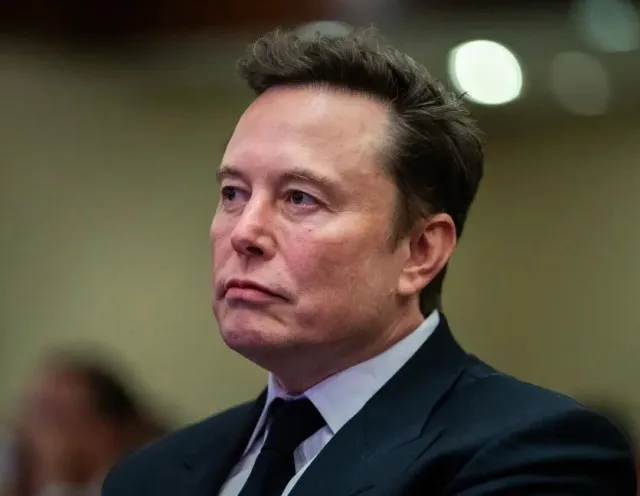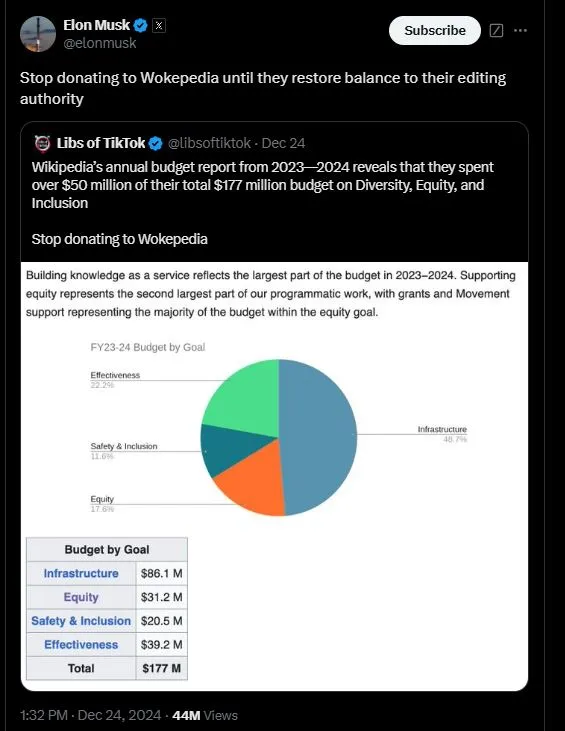Elon Musk has sparked fresh controversy by urging his followers to stop supporting Wikipedia financially. The call to action came after it was revealed that the Wikimedia Foundation allocated over $50 million to Diversity, Equity, and Inclusion (DEI) initiatives as part of its 2023-24 budget. Musk, known for his blunt takes on social and political matters, voiced concerns over the platform’s spending and questioned its political neutrality. This bold move has reignited debates surrounding Wikipedia’s editorial direction and financial priorities.
Wikipedia’s $50 Million DEI Budget: A Breakdown

Wikipedia, one of the world’s largest and most influential online platforms, has a $177 million budget for 2023-24. Out of this, approximately $51.7 million—or 29%—has been allocated to DEI initiatives. These funds are split into two primary categories:
- Equity Projects: $31.2 million (17.6% of the budget)
- Safety and Inclusion Efforts: $20.5 million (11.6% of the budget)
In contrast, the largest chunk of the budget—48.7%, or $86.1 million—is directed toward infrastructure to maintain the site’s global operations. While DEI spending represents a minority of the overall budget, critics argue that these initiatives stray from Wikipedia’s core mission of providing neutral, crowd-sourced information.
Elon Musk’s Criticism of Wikipedia
Using his platform on X (formerly Twitter), Musk expressed strong disapproval of Wikipedia’s financial priorities. Responding to a post by “Libs of TikTok,” which highlighted the foundation’s DEI spending, Musk sarcastically referred to Wikipedia as “Wokepedia.” He then urged his nearly 210 million followers to halt donations to the platform, stating, “Stop donating to Wokepedia until they restore balance to their editing authority.”
Musk’s statement reflects broader frustrations among right-leaning figures regarding DEI policies. He and other critics argue that such initiatives are often politically motivated and foster divisiveness rather than inclusivity.
The DEI Debate: A Divisive Topic
Diversity, Equity, and Inclusion have become hot-button issues in recent years. The goal of DEI policies is to promote a more inclusive environment for underrepresented groups. However, these initiatives have faced backlash from conservative voices who see them as fostering “reverse discrimination” and prioritizing diversity over merit.
The rise of DEI policies gained significant momentum after the 2020 death of George Floyd, which led to widespread corporate commitments to social justice. However, public backlash and economic pressures have led some major corporations—such as Walmart, Boeing, and Ford—to scale back or reassess their DEI efforts.
Wikipedia’s commitment to spending a significant portion of its budget on DEI initiatives has drawn criticism from those who believe the platform is prioritizing social activism over its core function: providing unbiased and accurate information.
Is Wikipedia Politically Neutral?

Wikipedia has long claimed political neutrality, but critics argue otherwise. Studies suggest that the platform exhibits a left-leaning bias in its content and editorial decisions. For instance, a report by the Manhattan Institute found that Wikipedia articles about right-leaning public figures tend to use more negative language compared to entries about left-leaning individuals.
An example of perceived bias occurred earlier this year when Wikipedia edited Vice President Kamala Harris’s profile. The edit removed references to her as a “border czar” shortly after President Joe Biden endorsed her for the 2024 election. This decision sparked accusations that Wikipedia’s editorial team was aligning with political narratives.
Larry Sanger’s Critique of Wikipedia
Larry Sanger, Wikipedia’s co-founder, has been an outspoken critic of the platform’s editorial practices. He claims that left-leaning volunteers dominate Wikipedia’s editorial process, selectively shaping content to fit specific political narratives. As evidence, Sanger pointed to the platform’s handling of controversial topics, such as the suppression of the Hunter Biden laptop story.

Sanger’s criticisms have added to tensions between him and Wikipedia’s other co-founder, Jimmy Wales. The two have publicly clashed over their roles in the platform’s creation and the direction it has taken in recent years. Sanger argues that Wikipedia has deviated from its founding principles of neutrality and open collaboration.
Elon Musk Joins the Debate
Musk’s call to halt donations is the latest chapter in the ongoing scrutiny of Wikipedia’s practices. While Musk is no stranger to controversy, his influence as one of the world’s most prominent tech leaders adds weight to the debate. By calling attention to Wikipedia’s DEI spending and alleged bias, Musk has reignited conversations about the platform’s accountability and its role in shaping public discourse.
The Bigger Picture: Wikipedia’s Role in Society
Wikipedia remains one of the most visited websites globally, with millions relying on it for information. However, its influence also makes it a focal point for debates about political neutrality, censorship, and the responsibilities of online platforms. Critics argue that Wikipedia’s substantial investment in DEI initiatives diverts resources away from its primary mission of providing free, unbiased knowledge.

On the other hand, supporters of DEI spending contend that fostering inclusivity and addressing systemic inequalities are essential for Wikipedia’s long-term sustainability. They argue that a diverse editorial community leads to more comprehensive and representative content.
Conclusion: The Ongoing Debate Over Wikipedia’s Priorities
Elon Musk’s criticism of Wikipedia’s $50 million DEI budget has amplified concerns over the platform’s spending priorities and political neutrality. While DEI initiatives aim to create a more inclusive environment, they remain polarizing, with critics viewing them as politically charged and detracting from Wikipedia’s mission.
As Wikipedia continues to face scrutiny, questions about its editorial practices and financial decisions will likely persist. Musk’s call to action is a reminder of the power of public figures to influence discourse on major issues. Ultimately, the debate over Wikipedia’s direction underscores the need for transparency and accountability in platforms that shape public knowledge.


